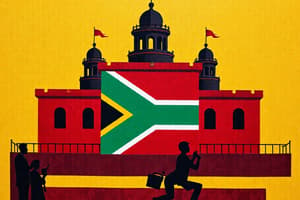Podcast
Questions and Answers
What do we call the basic rules that citizens and the government have to follow in a democracy?
What do we call the basic rules that citizens and the government have to follow in a democracy?
- Legal regulations
- Constitution (correct)
- Laws of the land
- Government guidelines
What is the constitution considered as in a country?
What is the constitution considered as in a country?
- A set of guidelines for rulers
- A code of conduct for citizens
- An advisory document for leaders
- The supreme law of the land (correct)
Who determines the foundational values of a constitution in a democratic state?
Who determines the foundational values of a constitution in a democratic state?
- Citizens through a referendum
- The ruling political party
- The judiciary
- Constitutional experts and lawmakers (correct)
Can changes be made to a constitution after it's accepted?
Can changes be made to a constitution after it's accepted?
In what way does the constitution provide a framework for citizens' conduct and that of the government?
In what way does the constitution provide a framework for citizens' conduct and that of the government?
What is a recent instance mentioned in the text regarding the designing of a constitution for a democratic state?
What is a recent instance mentioned in the text regarding the designing of a constitution for a democratic state?
What was the system of racial discrimination unique to South Africa called?
What was the system of racial discrimination unique to South Africa called?
What was the name given to the people of mixed races in South Africa?
What was the name given to the people of mixed races in South Africa?
In which South African prison did Nelson Mandela spend 28 years?
In which South African prison did Nelson Mandela spend 28 years?
What was the name of the umbrella organization that led the struggle against apartheid policies?
What was the name of the umbrella organization that led the struggle against apartheid policies?
Which group did the white rulers in South Africa treat as inferiors?
Which group did the white rulers in South Africa treat as inferiors?
What did the apartheid system forbid the blacks from doing?
What did the apartheid system forbid the blacks from doing?
What were the non-whites in South Africa prohibited from doing in public places?
What were the non-whites in South Africa prohibited from doing in public places?
Flashcards are hidden until you start studying
Study Notes
Core Principles of Democracy
- Basic rules that citizens and government must adhere to in a democracy are known as the constitution.
- The constitution acts as the foundational legal document for a country, establishing the government framework and citizen rights.
Values and Amendments of a Constitution
- Foundational values of a constitution in a democratic state are determined by founding fathers, lawmakers, and the public through debates and referendums.
- Changes can be made to a constitution after acceptance through established amendment processes, allowing for updates in response to evolving societal needs.
Framework for Governance
- The constitution provides a comprehensive framework outlining the expected conduct of citizens and the government, ensuring accountability, rights protection, and the rule of law.
Historical Context of Constitution Design
- A recent instance of designing a constitution for a democratic state includes the transition of South Africa from apartheid to democracy in the early 1990s.
Apartheid System in South Africa
- The racial discrimination system unique to South Africa was known as apartheid, characterized by institutionalized segregation and discrimination against non-white populations.
- Individuals classified as people of mixed races in South Africa were referred to as Coloureds.
Nelson Mandela and the Struggle Against Apartheid
- Nelson Mandela spent 28 years in Robben Island prison due to his opposition to apartheid.
- The umbrella organization that led the struggle against apartheid policies was the African National Congress (ANC).
Treatment of Racial Groups
- The apartheid system treated various racial groups, particularly blacks, as inferiors, systematically denying them basic rights and privileges.
- Under apartheid, blacks were forbidden from participating in many aspects of public life, including voting, owning property in certain areas, and accessing certain facilities.
- Non-whites were prohibited from using many public places, such as beaches, parks, and schools, reinforcing the segregationist policies of the apartheid regime.
Studying That Suits You
Use AI to generate personalized quizzes and flashcards to suit your learning preferences.




